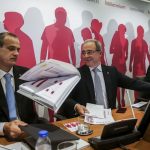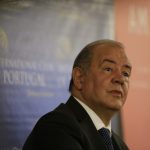Braga – a beacon for a brighter future
Braga’s dynamic mayor Ricardo Rio was the guest speaker at the International Club of Portugal on Tuesday where he outlined just what makes this city special and why it has won so many European and international awards and distinctions.
Text: Chris Graeme Photo: Joaquim Morgado
Barga’s mayor Ricardo Rio is certainly one of the most energetic public servants to have run a city anywhere in Portugal.
Raised in Braga, the former General-Secretary of the Portuguese Association of Financial Analysts and ex-Director of Capital Markets at Euronext Lisbon, Ricardo Rio is now in his third and final term as the mayor of this city which nestles in a basin surrounded by woodland hills and is fondly nicknamed the ‘Potty of Portugal’ (Penico de Portugal) because it has a much higher rainfall than almost any other city in the country.
In the time Ricardo Rio has been managing this ancient city’s affairs one way or another – Braga was a major centre in Roman times as Bracara Augusta – either sitting on Braga’s Municipal Assembly (2001-2005), or as an executive council officer (2005-2013), or thrice Mayor (2013-to the present), he has become almost a legendary as London’s Dick Whittington, of three-times mayor fame, but for completely different reasons.
In the time he has occupied the top man’s chair at city hall, Braga as gone from being a regional and rather provincial backdrop that most foreigners had never heard of, let alone visited, unless, of course, they were particularly religious — the historic Baroque city is the third most important Catholic site in Portugal after Lisbon and Fátima.
In fact, over the past decade alone Braga is now on the international map in terms of tourism, company relocations, startups, quality of life, historic monuments, higher education, research and innovation and social projects. A brief look at just some of the many International and European recognitions speaks volumes when it comes to illustrating how this mayor and his team have arguable turned Braga into Portugal’s third capital after Lisbon and Porto.
In 2012 Braga was European Youth Capital, in 2016 the city was the Capital of the Euro-Ibero-American Youth Forum, in 2018 it was European City of Sport and was considered the ‘Best European Sports City’ ever. From 2020-2021 it was Capital of Culture of the Atlantic Axis, also in 2021 it was European Social Innovation Capital, and is currently one of the four finalists for European Culture Capital 2027 along with Aveiro, Ponta Delgada and Évora.
Braga was also a runner up in 2021 for European Innovation Capital, and was in the Top 5 cities in the Financial Times ranking of European Cities and Regions of the Future because of their overseas investment strategies. (Cities of up to 200,000 inhabitants)
It was the second time Braga had risen up the FT fDi Magazine Intelligence ranking. It had been in 7th place in 2020/2021, but rose two places to 5th position, bringing it close on the heels of Middlesborough in 3rd place.
Ricardo Rio who is also President of InvestBraga, said that the FT distinction proved the success of the Council’s strategy and hard work, particularly that developed by InvestBraga which had done so much to attract investment to the borough.
“Our rise in the ranking also showed the importance of the overseas marketing and promotion that we have been doing in recent years which has enabled us to attract the attention of large multinationals which have set up in the borough and created new jobs” he said at a luncheon of business leaders organised by the International Club of Portugal (ICPT) on Tuesday.
In order to compile the ranking, a jury panel had been invited by fDi Magazine to evaluate the investment promotion strategies of 75 cities and European regions according to population sizes.
Various indicators had been taken into consideration such as the type of investment attracted over the past 18 months, the sectors that had grown the most, and the initiatives taken to foster post-pandemic economic recovery.
In terms of tourism, Braga was European Best Destination 2021, and was evaluated by the Carbon Disclosure Project as one of the 60 best cities in the world in fighting climate change in terms of its strategies.
The previous year, 2020, Ricardo Rui was elected onto the Executive Committee of Eurocities for a three-year term. Eurocities is the largest European network of cities. “This was an election which was highly relevant to Braga (He got the third highest number of votes (54)) and means that we are on the road to becoming an important part of the greatest and most relevant network of European cities, with a huge impact on European institutions” he said.
And added:“It was the culmination of all our hard work on our strategy to put Braga on the International map; a strategy and ambition which we had worked hard on from the start of our term in office managing the city”.
Braga became a member of the Eurocities network in 2016 and has actively been involved in different working groups and forums. More recently, Rio was nominated to head the SME and Entrepreneurialism Working Group.
An award winning mayor
In 2021 Ricardo Rio was elected the Winner of the 2021 World Mayor Sustainability Award for his efforts to deliver Sustainability Development Goals (SDGs) at local and regional levels in the EU.
Among European mayors, Ricardo Rio is one of the most passionate believers in sustainable development. He is determined to show that sustainability is not only compatible with economic growth but also a necessity to allow future generation to benefit from it.
In his essay for the World Mayor Project, Mayor Rio wrote: “sustainable growth is required to provide citizens with a good quality of life”.
And continued: “Braga, as one of Europe’s most favourite tourist destinations, must not become an overrun ‘theme park’. Braga belongs to a network of eight medium-sized European cities that promote sustainable tourism. The group of cities that aims to develop strategies that balance the needs of visitors with the interests of local residents”.
As far as Braga is concerned, the Mayor aims to make the city attractive to year-round tourism rather than just attract seasonal visitors and has been largely successful in this aim.
Asked in an interview with fellow citizens about Braga as a more Eco-friendly city, Mayor Rio said that for his administration it was very important to achieve goals of sustainable development and sustainable urban mobility, thereby creating a greener and less polluted city with better living conditions for the population.
Certainly, walking around the city’s main avenues the visitor is struck by the sheer amount of floral arrangements neatly laid out in flower beds, while there is no noticeable rubbish to be seen littering the pavements.
Exports and jobs
In terms of companies, the mayor pointed out that Braga has a very dynamic group of entrepreneurs in various diverse activity sectors, but over the past eight years or so Braga has now become Portugal’s third most important exporting district with over €2Bn of goods and services exported in 2021.
Before the pandemic, an average of over 2,000 new jobs were created in the borough per annum and Braga was the city that most grew in Portugal in terms of absolute numbers with +2000 people for a city of its size.
It was also the city that managed to attract the most companies from diverse sector areas for its size, many linked to cutting-edge areas in production and knowledge and know-how.
These include multinational companies like Fujitsu, Accenture, Farfetch and Bosch Car Multimedia Portugal which is the largest company employer in the city with 3,800 staff.
Other important companies in the municipality include Continental Mabor which makes tyres, Domingos da Silva Teixeira, a civil engineering and constriction firm, Carclasse (car sales), Ilídio Mota (wholesale petroleum products) and many other in the automotive, construction, components, moldes, chemical and textile sectors.
Braga – a centre of research and development
When it comes to research and development and synergies between companies, the startups ecosystem and higher education institutes, Braga and the surrounding Minho region has — thanks to companies like Bosch Car Multimedia Portugal, the University of Minho and Startup Braga – become one of the main research and development hubs for the automotive sector and allied Human-Machine Interface technology — a user interface or dashboard that connects a person to a machine, system, or device, as well as research for driverless cars for the future.
Braga today has one of the best universities in the country, the University of Minho, which despite being a young university with less than 50 years in existence, is already recognised by international rankings in terms of science and research and the quality of its various degree courses, with around 20,000 students, many of them international, studying at the institution.
The city also has one of the best research institutes in Europe, the INL International Iberian Nanotechnology Laboratory which was founded by the governments of Portugal and Spain under an international legal framework to perform interdisciplinary research and deploy and articulate nanotechnology for the benefit of society.
INL which employs 400 researchers from 40 different nationalities, aims to become a world-wide hub for nanotechnology addressing society’s grand challenges.
Its Research and Technology activities are focused on six clusters: Health, Food, Energy, Environment, ICT and Future Emerging Technologies, which complement each other and provide a base for interdisciplinary interactions between research.
“We’ve also made a significant number of excellent results in all areas that are relevant for a specific region”, he informed.
From a sustainability point of view the municipality was for the first time awarded ECOXXI Green Flag promoted by the European Blue Flag Association in which the city got 80.9% overall in the indicators that were evaluated, and was considered the third best borough overall in Portugal in terms of sustainability.
“Braga is a borough that places special relevance to sustainability. We’ve got projects linked to decarbonisation, a decarbonisation laboratory that we have developed in partnership with education and research institutions, with projects in he area of climate change adaptation”, said the mayor.
Social innovation
In the social innovation area, Braga is considered to be one of the cities which has channelled more investment over a wide range of areas. For example, Braga Labs has been set up contribute to employing people with autism and disabilities.
When it comes to investment support, the municipal council helped to set up InvestBraga which seeks to satisfy the needs of different types of investment according to sector and size. The organisation helps companies, particularly overseas companies, to set up in the region as well as supporting them in developing their investments in the borough.
InvestBraga is supported and partnered by various local and national bodies such as AICEP, the Portuguese government’s overseas investment bureau.
InvestBraga, the Agency for the Economic Dynamization of Braga, was created in March 2014, to act as the economic wing of the Municipality, with the mission of promoting the economic development of the city.
The institution works on the attraction of investment and entrepreneurs, making the innovation factor a major competitive advantage. InvestBraga’s activity covers four areas:
1. Economic dynamization and national and international investment attraction for the Municipality, through the Agency for the Economic Dynamization of Braga.
2. The development of pre-acceleration, acceleration and incubation programs for startups with global ambition, through Startup Braga, which is is an innovation hub designed to support entrepreneurial projects of great potential. Startup Braga works with dedicated and determined teams, who want to reach international markets.
3. The promotion and organisation of fairs, congresses, seminars and events, in Altice Forum Braga, aligned with the strategic positioning of the city in the national and international context.
4. The most recent business unit, Braga Youth Center, whose mission is to ensure accommodation and work conditions, capable of promoting Non-Formal Education, Human Rights and promoting projects of Creativity, Entrepreneurship, Citizenship and Youth Associations. It will seek to assert itself as a reference equipment for carrying out work with young people, with high quality standards, capable of implementing youth policies from a local and international perspective.
“We also have a large number of companies operating over a board range of sectors from traditional sectors such as civil construction, transports, metal-mechanics, information technology and tourism. Tourism has grown exponentially over the past decade and in the pre-pandemic period from 200,000 overnight stays to over 600,000 annually”, explained the Braga mayor.
“Today, Braga is a city that has everything to offer for a conurbation of its size, particularly, an extraordinary quality of life – According to Eurobarometer 2020, 97% of Braga’s population said they were happy to live in Braga and only Scandinavian cites competed with us by enjoying such a high percentage of their population feeling happy to live in their cities”, concluded the Mayor of Braga City Council, Ricardo Rio.
Photo: Braga Mayor Ricardo Rio with ICPT president Manuel Ramalho.










